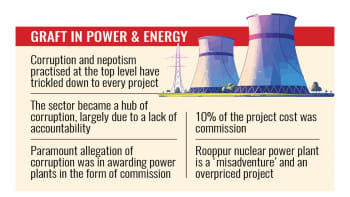PDB can save $1.2 billion a year by fixing core problems: IEEFA

Bangladesh Power Development Board (PDB) can save $1.2 billion or Tk 13,800 crore of annual losses -- currently covered by government subsidies -- by fixing electricity sector's core problems, according to the Institute for Energy Economics and Financial Analysis (IEEFA), a global energy think-tank.
Bangladesh can achieve the savings by shifting half of the existing industrial demand to the grid, which is currently met by captive generators, and adding 3,000 megawatts (MW) of renewables, reducing load-shedding and limiting transmission and distribution losses, according to a report of the non-profit organisation.
During 2019-20 to 2023-24, the PDB's total annual expenditure increased 2.6-fold against revenue growth of 1.8 times, prompting the government to allocate a combined subsidy of Tk 126,700 crore to ensure power supply to keep the economy afloat, the report found.
Yet, the PDB recorded a cumulative loss of Tk 23,642 crore, the IEEFA said.
In order to bring the subsidy burden down to nearly zero, the institute recommended ensuring industries fully rely on the national electricity grid.
"Additionally, the country should gradually transition to electric systems from gas-driven appliances, like boilers. This will help increase the PDB's revenue from selling additional energy while reducing capacity payments to idle plants," it said.
As the first step of the reform, the report calls on the government to forecast power demand from 2025 by factoring in energy efficiency gains and demand shift measures.
IEEFA's projection by factoring in such variables shows that the country's peak power demand in 2030 is likely to be 25,834 MW, down from the Integrated Energy and Power Master Plan's (IEPMP) forecast -- made in July 2023 -- of an amount in between 27,138 MW and 29,156 MW.
Simultaneously, the IEEFA roadmap also suggested halting investment in fossil fuel-based power and limiting the use of oil-fired plants to 5 percent of total power generation.
If Bangladesh takes these steps along with the anticipated 4,500 MW of fossil-fuel-based power plant retirements by 2030, the country will have a system capacity of 35,239 MW, the think-tank predicted.
"A system capacity of 35,239 MW will help Bangladesh meet the peak demand of 25,834 MW by 2030. It will bring the reserve margins down to 20 percent, which is comparable to countries like India and Vietnam," said Shafiqul Alam, IEEFA's lead energy analyst for Bangladesh.
"The window to make Bangladesh's power sector sustainable is rapidly narrowing, but there is still time to get the sector back on track by following a suitable roadmap," he said.

 For all latest news, follow The Daily Star's Google News channel.
For all latest news, follow The Daily Star's Google News channel. 






Comments